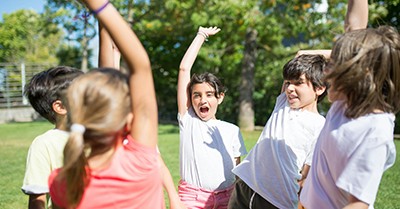The following provides a list of activity ideas for each sub-outcome of MTOP Outcome 1: Children Have a Strong Sense of Identity.
Indoor Activity Ideas
1.1 - Children and young people feel safe, secure, and supported
- "All About Me" Collage: Children create a collage with pictures and words that represent their interests, family, and culture.
- Comfort Corner: Set up a cozy space with soft cushions and books where children can relax and feel safe.
- Daily Check-In: Encourage children to share how they feel each day using emotion cards or a feelings chart.
- My Safe Space Drawing: Children illustrate a place where they feel most comfortable and explain why.
- Emotion Stones: Paint stones with different emotions and use them for storytelling or discussions about feelings.
- Trust Walk: Pair children up and have one guide the other while they are blindfolded to build trust and communication.
1.2 - Children and young people develop autonomy, interdependence, resilience, and a sense of agency
- Choice-Based Learning: Allow children to select activities based on their interests, fostering independence.
- Team Challenges: Organize group tasks like building a tower with blocks or solving a puzzle together.
- Resilience Stories: Read books about perseverance and discuss how characters overcome challenges.
- You Decide Activity: Present different scenarios where children make choices and discuss the outcomes.
- Obstacle Course Challenge: Set up a physical challenge that encourages persistence and problem-solving.
- Community Helpers Role-Play: Let children take on roles like firefighters, doctors, or teachers to explore responsibility.
1.3 - Children and young people develop knowledgeable and confident self-identities
- Cultural Sharing Circle: Children bring an item or story from their culture to share with the group.
- Identity Journals: Provide notebooks where children can write or draw about their experiences and personal growth.
- Role-Playing Games: Encourage children to act out different professions or scenarios to explore identities.
- Personal Timeline: Children create a timeline of important events in their lives to reflect on their growth.
- Cultural Celebration Days: Organize themed days where children share traditions, food, and stories from their backgrounds.
- Who Am I?" Game: Children write three facts about themselves on a card, and others guess who it belongs to.
1.4 - Children and young people learn to interact with care, empathy, and respect
- Kindness Tree: Children write kind words or actions on paper leaves and add them to a tree display.
- Buddy System: Pair children up to support each other in activities and build friendships.
- Conflict Resolution Role-Play: Teach children how to resolve disagreements through guided role-playing exercises.
- Compliment Circle: Children take turns giving each other genuine compliments to build positive relationships.
- Story Swap: Pair children up to share personal stories and encourage active listening.
- Helping Hands Chart: Create a visual display where children record acts of kindness they’ve done for others.
Outdoor Activity Ideas
1.1 - Children and young people feel safe, secure, and supported
- Nature Mandalas: Children collect natural materials (leaves, stones, flowers) and arrange them into patterns, fostering mindfulness and a sense of belonging.
- Outdoor Storytelling Bench: Set up a designated storytelling space where children can share personal experiences or listen to cultural tales.
- Animal Observation Walk: Encourage children to observe birds, insects, or animals and discuss how different creatures find safety in their environments.
1.2 - Children and young people develop autonomy, interdependence, resilience, and a sense of agency
- Survival Skills Challenge: Teach basic outdoor survival skills like building a shelter or identifying edible plants.
- Outdoor Leadership Roles: Assign children different roles (navigator, timekeeper, motivator) during group activities to build independence.
- Physical Endurance Games: Activities like long-distance walking or climbing encourage resilience and perseverance.
1.3 - Children and young people develop knowledgeable and confident self-identities
- Outdoor Talent Showcase: Let children perform songs, dances, or storytelling in an open space to express their individuality.
- Cultural Landmark Hunt: Hide symbols or objects representing different cultures and encourage children to find and discuss them.
- Personal Growth Trail: Set up a path with stations where children reflect on their strengths and achievements.
1.4 - Children and young people learn to interact with care, empathy, and respect
- Outdoor Gratitude Circle: Children take turns sharing something they appreciate about nature or their peers.
- Community Garden Project: Encourage children to plant and care for a shared garden, fostering teamwork and responsibility.
- Outdoor Kindness Challenge: Set up a scavenger hunt where children complete acts of kindness, such as helping a friend or picking up litter.
Further Reading
MTOP Learning Outcomes V2.0
Principles Of The MTOP Version 2.0
Understanding MTOP Outcome 1
